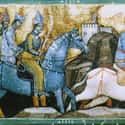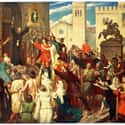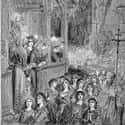-
(#7) The First Crusade Went Way Better Than Anyone Expected
Urban II's call to arms was a huge success. Tens of thousands of people attempted to join the growing Crusader armies, but most were peasants with no combat training. The exact numbers are unknown, but it's generally agreed upon that about 35,000 soldiers under the command of four different princes left Europe for the Byzantine capital Constantinople in August 1096.
After that, they crossed into Asia Minor, laid siege to several major cities, including Nicaea and Antioch, then finally reached Jerusalem in 1099. Only a third of the initial 35,000 strong force was left, forcing an attack on multiple sides of the walled city. Jerusalem was taken when the defenders abandoned the walls, and the Crusaders entered the city. They took the Church of the Holy Sepulcher, established the Kingdom of Jerusalem, and slaughtered most of the remaining Muslim and Jewish defenders. The First Crusade had been a stunning success — if you were European and didn't mind mass slayings.
-
(#22) The Crusades Drew In Many Luminaries Of The Time
Two hundred years of Crusades involved a number of well-known names in European, Muslim, and Mongol history. Countless princes, dukes, and royalty fought in the various Crusades, including King Richard I of England, Eleanor of Aquitaine of France, Saladin, Balian of Ibelin, Frederick Barbarossa, King Edward I of England (a.k.a. Longshanks), and numerous prominent Popes.
-
(#20) The Mongols Got Involved In The Whole Thing
When Jerusalem fell to the Kwarezhmians in 1244, many European Christians looked outside the box for allies in fighting the Muslim menace. Around the same time, in 1242, the Mongol threat to western Europe ended with the passing of Ogedai Khan, the son and successor of Genghis. The lull in conflict in the east led to the proposal of a Franco-Mongol alliance to take Jerusalem back from an empire that was already an enemy of the Mongols. Pope Innocent IV sent an envoy, the monk John of Plano Carpini, to the Mongol capitol of Karakorum, with an incomprehensible letter asking for peace and assistance dealing with Islam. But the new Khan, Guyuk, responded with a demand that the Pope submit to Mongol rule. The alliance never came to fruition, and the Mongols would eventually go to war with Islam, laying waste to Baghdad.
-
(#27) The Crusades Are Still Talked About — Often Incorrectly
For the better part of a millennium after they ended, the Crusades faded from the collective memories of Western Europe and the Middle East. The Christian world embraced the Renaissance, then the rush of colonialism. European nationalism in the 19th century led historians to rediscover the Crusades as heroic examples of French, British, or German chivalry and martial valor. Even now, both Western and Muslim pundits come back to the Crusades when they need a shorthand for “atrocities.” Western conservatives often see the Crusades as an attempt to liberate the Holy Land from heathens, and liberals point out that mass slaying was carried out on all sides. When President Barack Obama mentioned Christian atrocities carried out during the Crusades, he was accused of belittling Christianity, despite the fact that it’s an indisputable fact that Christian Crusaders did in fact slay numbers of Jews, Muslims, Byzantine Greeks, and others.
-
(#24) The Infamous Children's Crusade Might Not Have Ever Happened
The Children's Crusade is one of the most controversial aspects of studying this period of the Middle Ages. Traditional accounts say that in or around 1212, a French or German boy began preaching that he'd been called on by God to liberate the Holy Land. He gathered a huge band of children, and together they marched toward the Mediterranean Sea, expecting it to part. When it didn't, the children either drowned or were captured and sold into slavery. Modern scholarship disputes almost every aspect of this story. While the Crusade is mentioned in dozens of period sources, the stories are contradictory and embellished. It's not clear whether there was actually an organized crusade, or if it was made up of children. Scholars generally agree separate French and German bands of mostly children, led by charismatic boy preachers, set out for the holy land and met disaster, but the details will never be known.
-
(#12) The Second Crusade Was A Humiliating Failure
In 1144, the Seljuk Turk general Zangī, governor of Mosul, captured the Crusader State of Edessa. The next year, Pope Eugenius III issued a call to arms similar to Urban II's bull of 1098. King Louis VII of France answered the call for the Second Crusade, as did King Conrad III of Germany, who was spurred on by the mystic monk Bernard of Clairvaux. They raised a massive army and marched to Constantinople, where they planned to retake Edessa and reinforce Jerusalem.
Instead, the two kings barely communicated and the attack was poorly planned. Their combined force was eventually beaten at Damascus, never having actually tried to liberate Edessa.
New Random Displays Display All By Ranking
About This Tool
The Crusades were a series of cruel religious military operations launched under the permission of the Roman Catholic Pope and lasted for nearly 200 years. At that time, Jerusalem, which belonged to the Holy Land of the Roman Catholic Church, fell into the hands of Islam. In order to regain the lost land, the Roman Catholic Church carried out many campaigns.
Rather than saying that the Crusades were a historical event, it is better to think that this is a historical period. This war has affected the development of religions throughout Europe. The random tool shares 27 interesting stories of the Crusades you must be interested in.
Our data comes from Ranker, If you want to participate in the ranking of items displayed on this page, please click here.
















